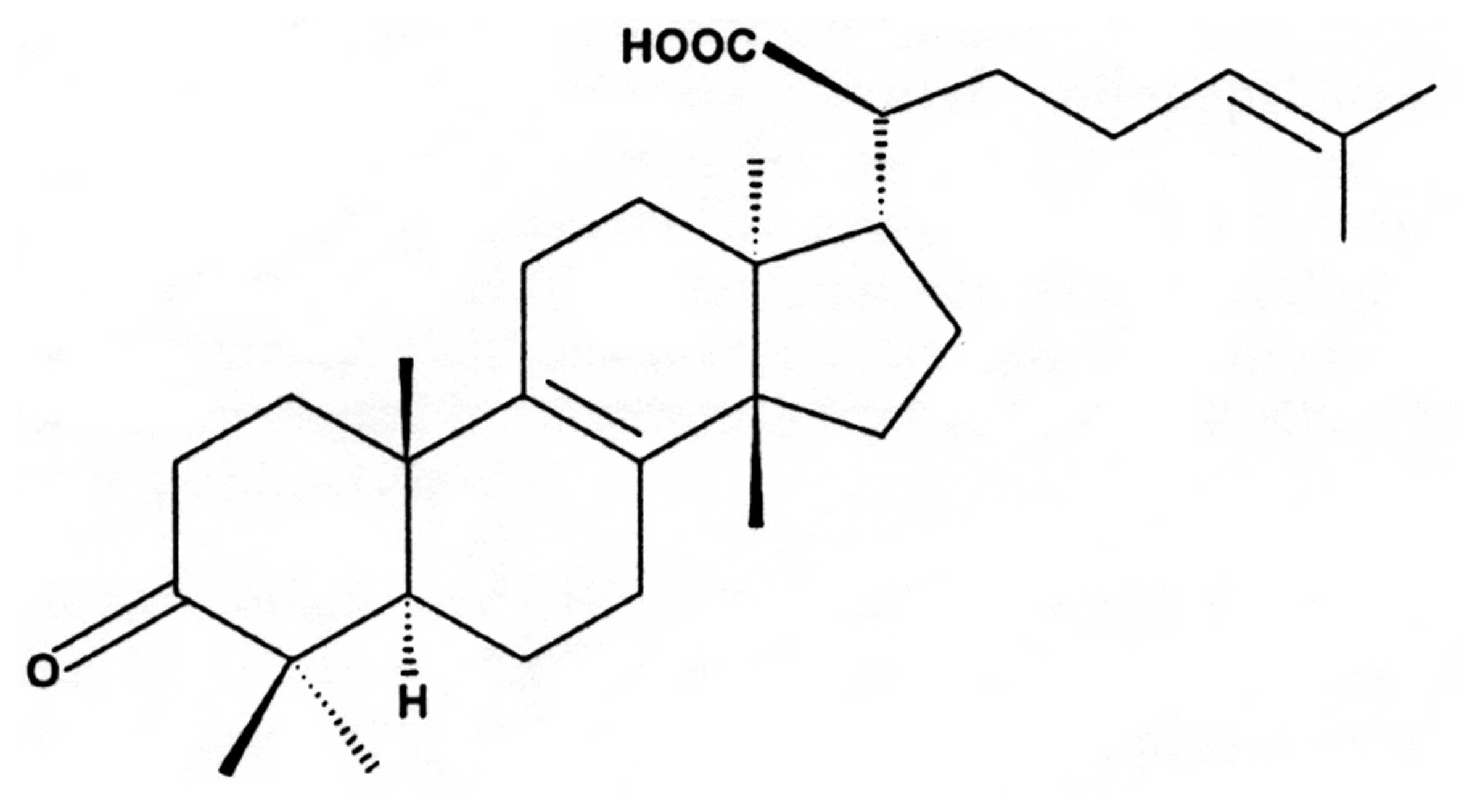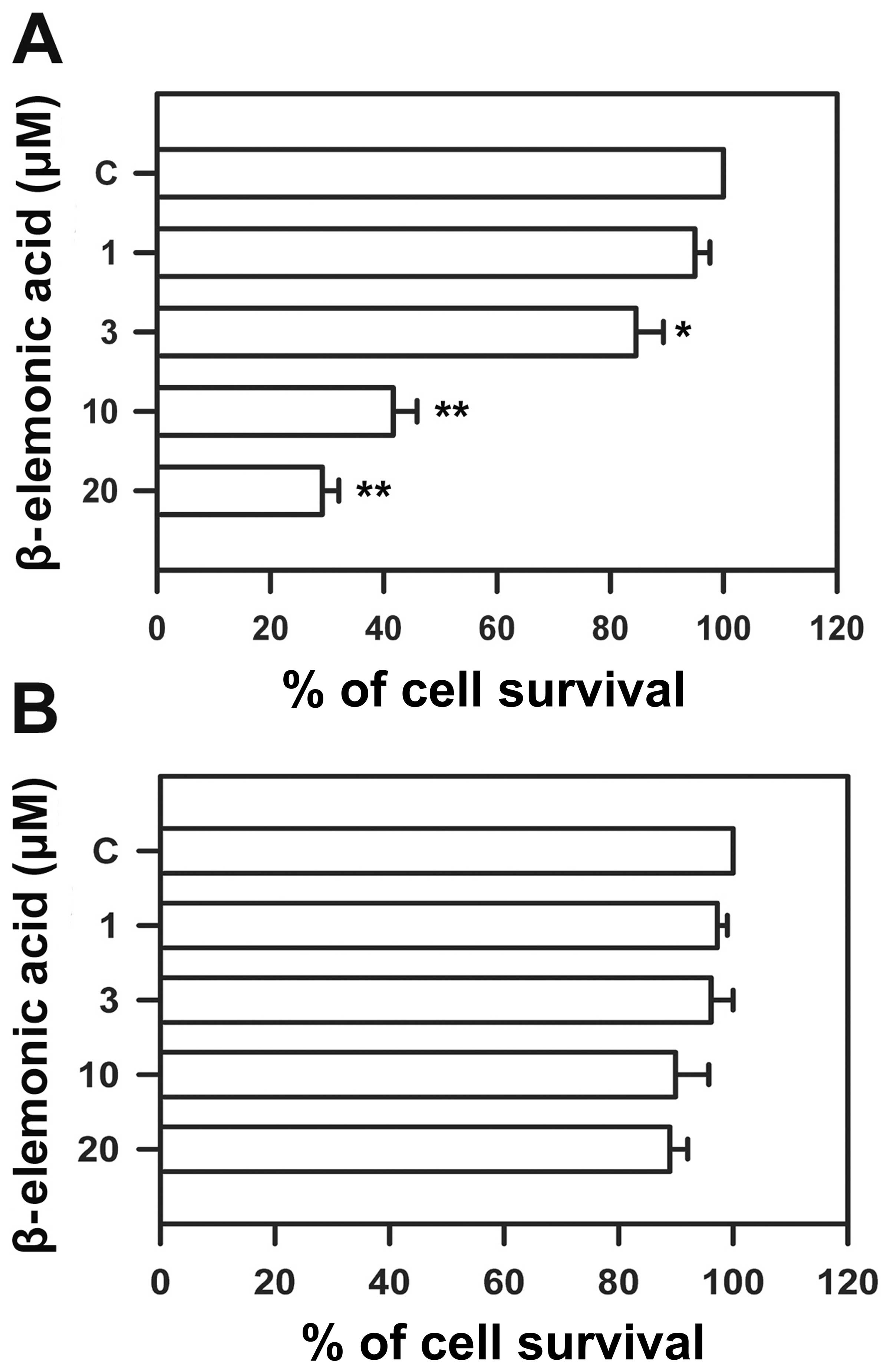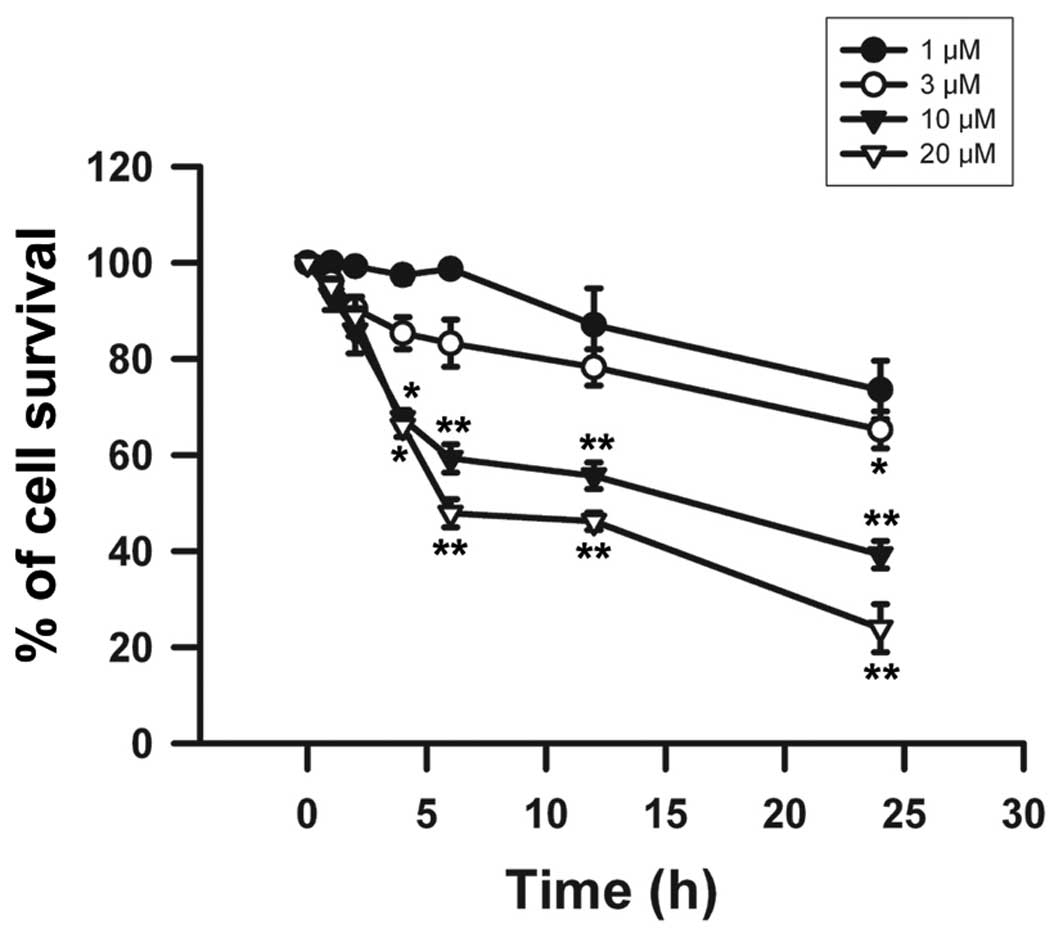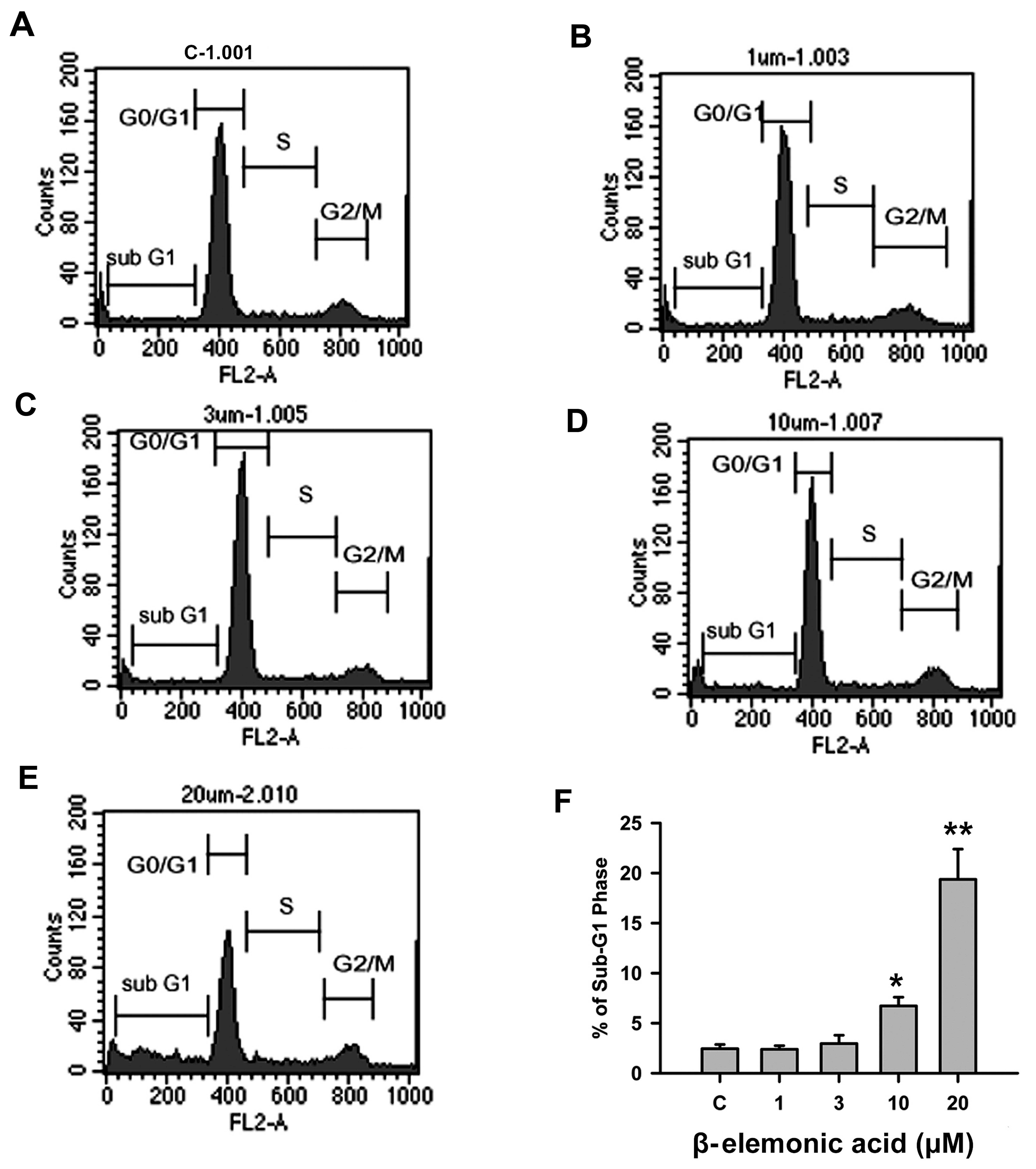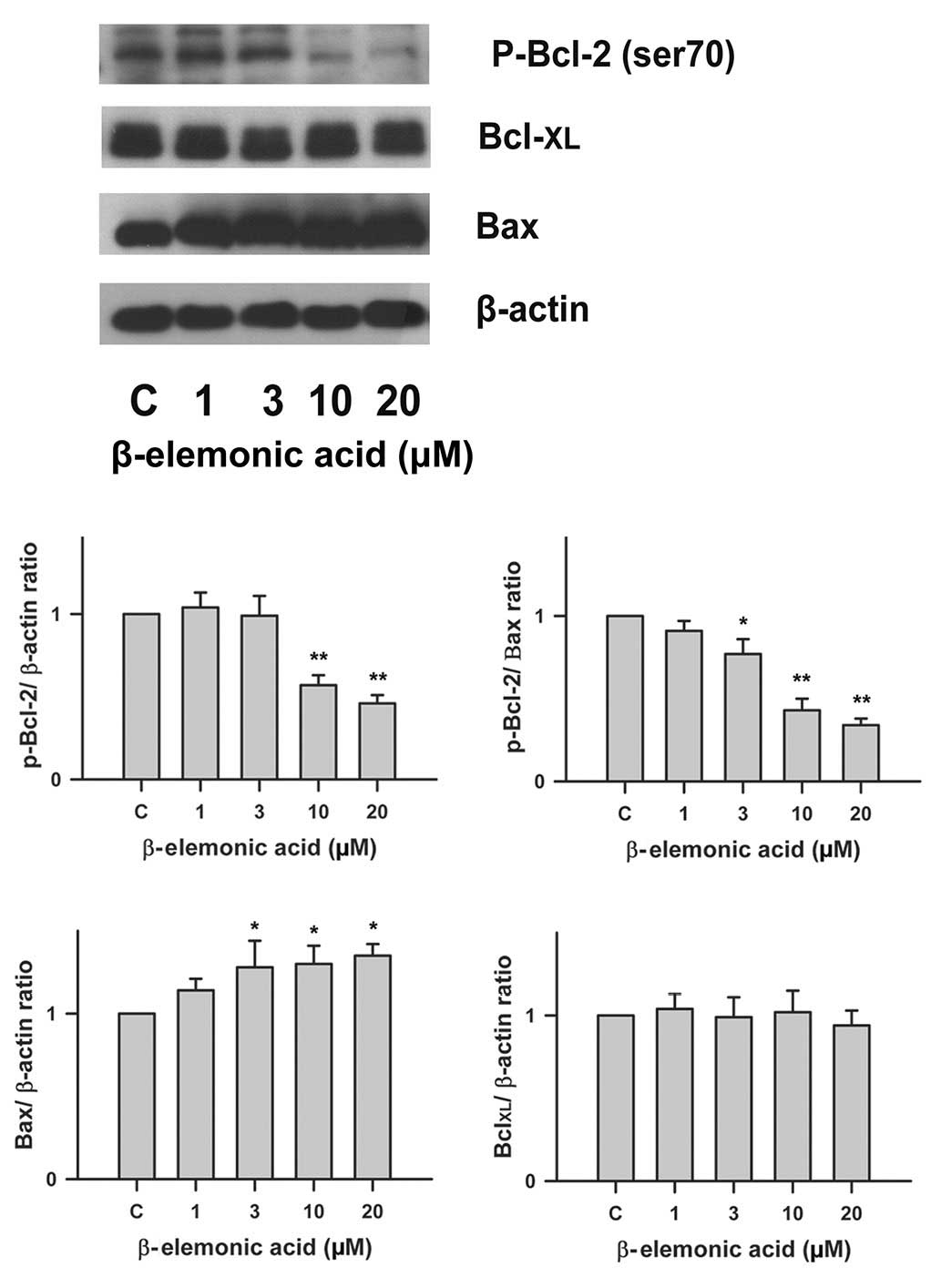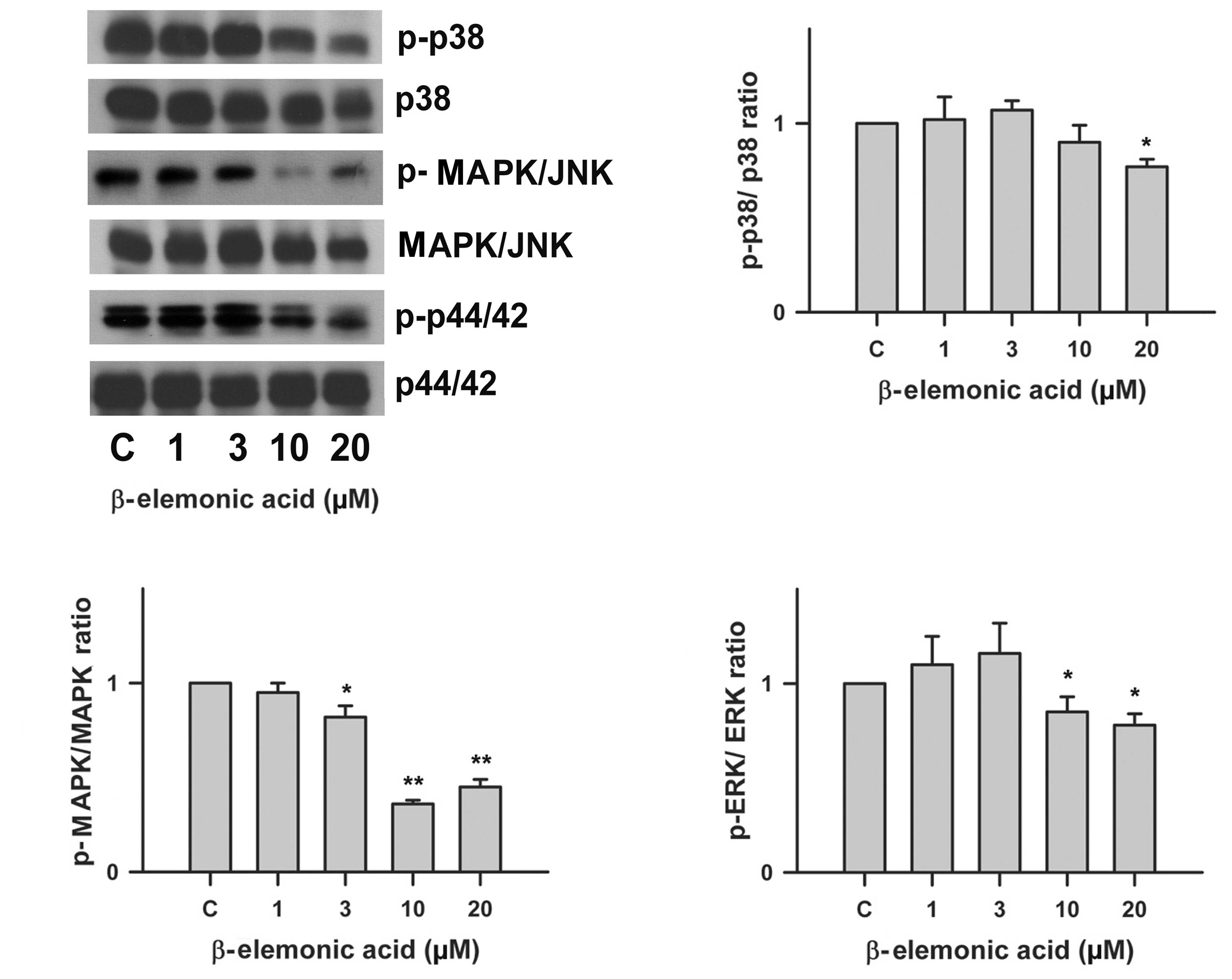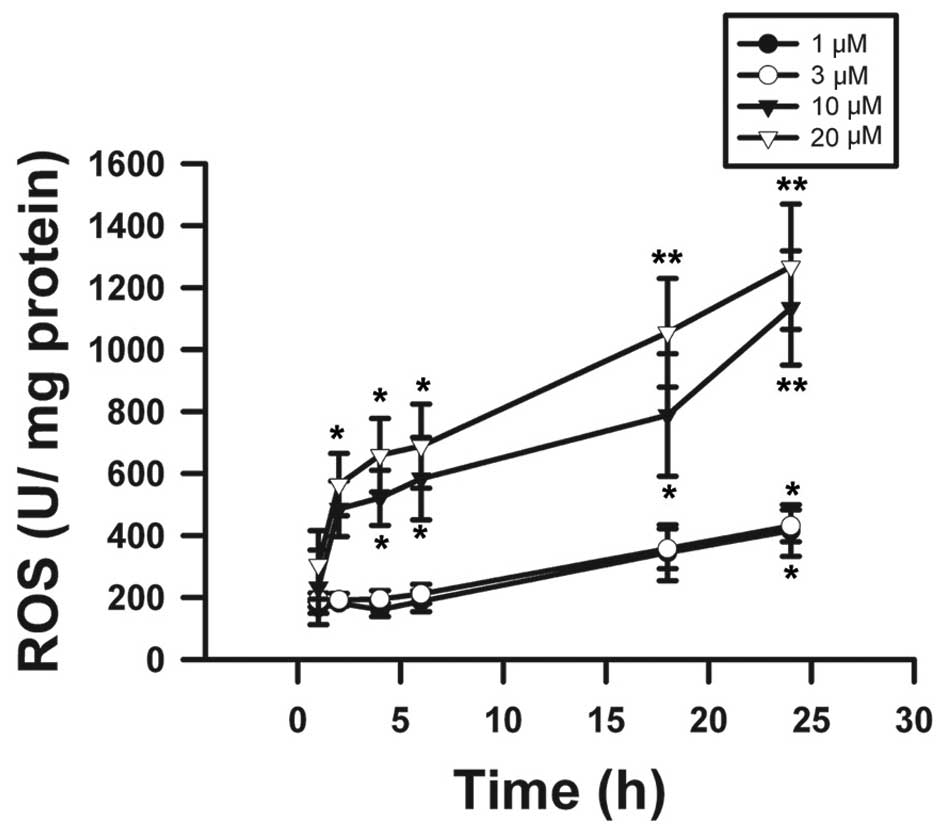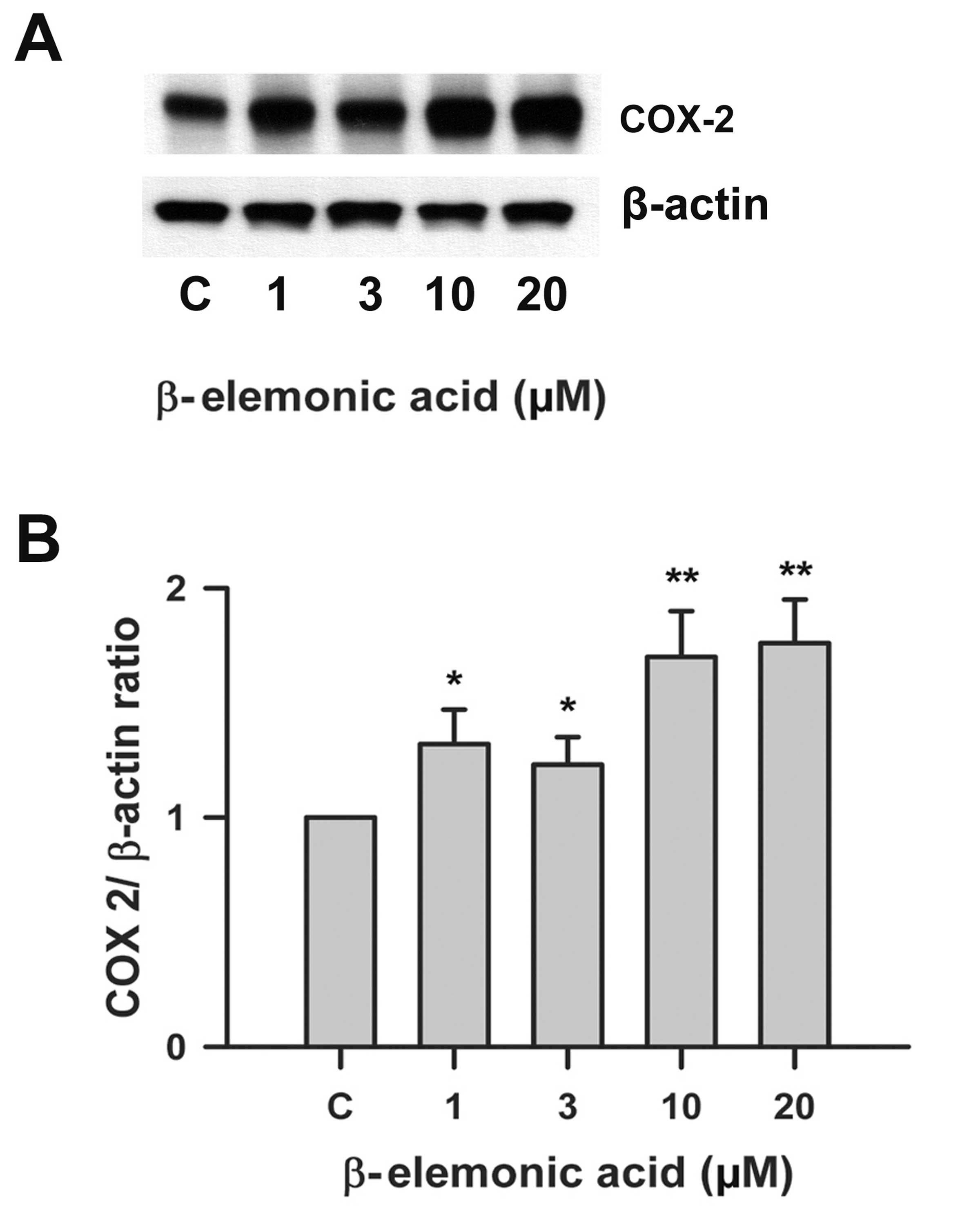|
1
|
Anonymous. Analysis in cancer incidence
and mortality - Taiwan. Epidermal Bull. 381–391. 1999.In
Chinese.
|
|
2
|
Sandler AB, Nemunaitis J, Denham C, von
Pawel J, Cormier Y, Gatzemeier U, Mattson K, Manegold C, Palmer MC,
Gregor A, et al: Phase III trial of gemcitabine plus cisplatin
versus cisplatin alone in patients with locally advanced or
metastatic non-small-cell lung cancer. J Clin Oncol. 18:122–130.
2000.PubMed/NCBI
|
|
3
|
Bonomi P, Kim K, Fairclough D, Cella D,
Kugler J, Rowinsky E, Jiroutek M and Johnson D: Comparison of
survival and quality of life in advanced non-small-cell lung cancer
patients treated with two dose levels of paclitaxel combined with
cisplatin versus etoposide with cisplatin: Results of an Eastern
Cooperative Oncology Group trial. J Clin Oncol. 18:623–631.
2000.PubMed/NCBI
|
|
4
|
Fisher DE: Apoptosis in cancer therapy:
Crossing the threshold. Cell. 78:539–542. 1994. View Article : Google Scholar : PubMed/NCBI
|
|
5
|
Kaufmann SH and Earnshaw WC: Induction of
apoptosis by cancer chemotherapy. Exp Cell Res. 256:42–49. 2000.
View Article : Google Scholar : PubMed/NCBI
|
|
6
|
Medema JP, Scaffidi C, Kischkel FC,
Shevchenko A, Mann M, Krammer PH and Peter ME: FLICE is activated
by association with the CD95 death-inducing signaling complex
(DISC). EMBO J. 16:2794–2804. 1997. View Article : Google Scholar : PubMed/NCBI
|
|
7
|
Adams JM and Cory S: The Bcl-2 protein
family: Arbiters of cell survival. Science. 281:1322–1326. 1998.
View Article : Google Scholar : PubMed/NCBI
|
|
8
|
Antonsson B and Martinou JC: The Bcl-2
protein family. Exp Cell Res. 256:50–57. 2000. View Article : Google Scholar : PubMed/NCBI
|
|
9
|
Kausch I and Böhle A: Antisense
oligonucleotide therapy in urology. J Urol. 168:239–247. 2002.
View Article : Google Scholar : PubMed/NCBI
|
|
10
|
McDonnell TJ, Beham A, Sarkiss M, Andersen
MM and Lo P: Importance of the Bcl-2 family in cell death
regulation. Experientia. 52:1008–1017. 1996. View Article : Google Scholar : PubMed/NCBI
|
|
11
|
Farrow SN and Brown R: New members of the
Bcl-2 family and their protein partners. Curr Opin Genet Dev.
6:45–49. 1996. View Article : Google Scholar : PubMed/NCBI
|
|
12
|
Schmitt E, Sané AT, Steyaert A, Cimoli G
and Bertrand R: The Bcl-xL and Bax-alpha control points: Modulation
of apoptosis induced by cancer chemotherapy and relation to
TPCK-sensitive protease and caspase activation. Biochem Cell Biol.
75:301–314. 1997.PubMed/NCBI
|
|
13
|
Meade EA, McIntyre TM, Zimmerman GA and
Prescott SM: Peroxisome proliferators enhance cyclooxygenase-2
expression in epithelial cells. J Biol Chem. 274:8328–8334. 1999.
View Article : Google Scholar : PubMed/NCBI
|
|
14
|
Pontsler AV, St Hilaire A, Marathe GK,
Zimmerman GA and McIntyre TM: Cyclooxygenase-2 is induced in
monocytes by peroxisome proliferator activated receptor gamma and
oxidized alkyl phospholipids from oxidized low density lipoprotein.
J Biol Chem. 277:13029–13036. 2002. View Article : Google Scholar : PubMed/NCBI
|
|
15
|
Kalajdzic T, Faour WH, He QW, Fahmi H,
Martel-Pelletier J, Pelletier JP and Di Battista JA: Nimesulide, a
preferential cyclooxygenase 2 inhibitor, suppresses peroxisome
prolif-erator-activated receptor induction of cyclooxygenase 2 gene
expression in human synovial fibroblasts: Evidence for receptor
antagonism. Arthritis Rheum. 46:494–506. 2002. View Article : Google Scholar : PubMed/NCBI
|
|
16
|
Mitchell JA, Belvisi MG, Akarasereenont P,
Robbins RA, Kwon OJ, Croxtall J, Barnes PJ and Vane JR: Induction
of cyclo-oxygenase-2 by cytokines in human pulmonary epithelial
cells: Regulation by dexamethasone. Br J Pharmacol. 113:1008–1014.
1994. View Article : Google Scholar : PubMed/NCBI
|
|
17
|
Chen CC, Sun YT, Chen JJ and Chiu KT:
TNF-alpha-induced cyclooxygenase-2 expression in human lung
epithelial cells: Involvement of the phospholipase C-gamma 2,
protein kinase C-alpha, tyrosine kinase, NF-kappa B-inducing
kinase, and I-kappa B kinase 1/2 pathway. J Immunol. 165:2719–2728.
2000. View Article : Google Scholar : PubMed/NCBI
|
|
18
|
Davis RJ: Signal transduction by the JNK
group of MAP kinases. Cell. 103:239–252. 2000. View Article : Google Scholar : PubMed/NCBI
|
|
19
|
Chang L and Karin M: Mammalian MAP kinase
signalling cascades. Nature. 410:37–40. 2001. View Article : Google Scholar : PubMed/NCBI
|
|
20
|
Kyriakis JM and Avruch J: Mammalian
mitogen-activated protein kinase signal transduction pathways
activated by stress and inflammation. Physiol Rev. 81:807–869.
2001.PubMed/NCBI
|
|
21
|
Atta-ur-Rahman, Naz H, Fadimatou, Makhmoor
T, Yasin A, Fatima N, Ngounou FN, Kimbu SF, Sondengam BL and
Choudhary MI: Bioactive constituents from Boswellia papyrifera. J
Nat Prod. 68:189–193. 2005. View Article : Google Scholar : PubMed/NCBI
|
|
22
|
Lee HJ and Soliman MR: Anti-inflammatory
steroids without pituitary-adrenal suppression. Science.
215:989–991. 1982. View Article : Google Scholar : PubMed/NCBI
|
|
23
|
Mosmann T: Rapid colorimetric assay for
cellular growth and survival: Application to proliferation and
cytotoxicity assays. J Immunol Methods. 65:55–63. 1983. View Article : Google Scholar : PubMed/NCBI
|
|
24
|
Jow GM, Wu YC, Guh JH and Teng CM:
Armepavine oxalate induces cell death on CCRF-CEM leukemia cell
line through an apoptotic pathway. Life Sci. 75:549–557. 2004.
View Article : Google Scholar : PubMed/NCBI
|
|
25
|
An FF, Liu YC, Zhang WW and Liang L:
Dihydroartemisinine enhances dictamnine-induced apoptosis via a
caspase dependent pathway in human lung adenocarcinoma A549 cells.
Asian Pac J Cancer Prev. 14:5895–5900. 2013. View Article : Google Scholar : PubMed/NCBI
|
|
26
|
Koopman G, Reutelingsperger CP, Kuijten
GA, Keehnen RM, Pals ST and van Oers MH: Annexin V for flow
cytometric detection of phosphatidylserine expression on B cells
undergoing apoptosis. Blood. 84:1415–1420. 1994.PubMed/NCBI
|
|
27
|
Vaux DL and Korsmeyer SJ: Cell death in
development. Cell. 96:245–254. 1999. View Article : Google Scholar : PubMed/NCBI
|
|
28
|
Shamas-Din A, Kale J, Leber B and Andrews
DW: Mechanisms of action of Bcl-2 family proteins. Cold Spring Harb
Perspect Biol. 5:a0087142013. View Article : Google Scholar : PubMed/NCBI
|
|
29
|
Wada T and Penninger JM: Mitogen-activated
protein kinases in apoptosis regulation. Oncogene. 23:2838–2849.
2004. View Article : Google Scholar : PubMed/NCBI
|
|
30
|
Pelicano H, Carney D and Huang P: ROS
stress in cancer cells and therapeutic implications. Drug Resist
Updat. 7:97–110. 2004. View Article : Google Scholar : PubMed/NCBI
|
|
31
|
Põld M, Zhu LX, Sharma S, Burdick MD, Lin
Y, Lee PP, Põld A, Luo J, Krysan K, Dohadwala M, et al:
Cyclooxygenase-2-dependent expression of angiogenic CXC chemokines
ENA-78/CXC Ligand (CXCL) 5 and interleukin-8/CXCL8 in human
non-small cell lung cancer. Cancer Res. 64:1853–1860. 2004.
View Article : Google Scholar : PubMed/NCBI
|
|
32
|
Bakhle YS: COX-2 and cancer: A new
approach to an old problem. Br J Pharmacol. 134:1137–1150. 2001.
View Article : Google Scholar : PubMed/NCBI
|
|
33
|
Newton R, Kuitert LM, Bergmann M, Adcock
IM and Barnes PJ: Evidence for involvement of NF-kappaB in the
transcriptional control of COX-2 gene expression by IL-1beta.
Biochem Biophys Res Commun. 237:28–32. 1997. View Article : Google Scholar : PubMed/NCBI
|















